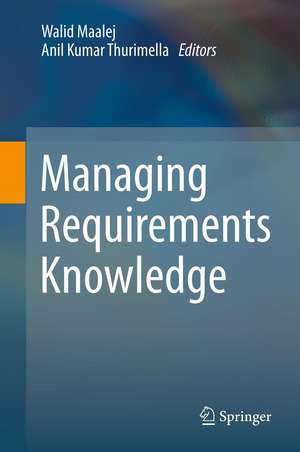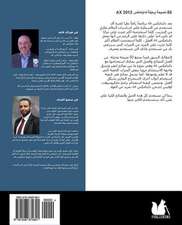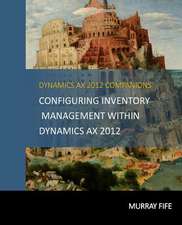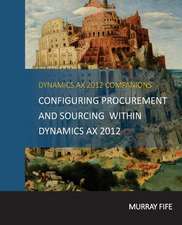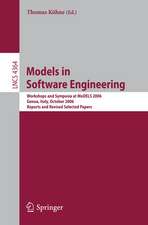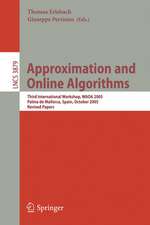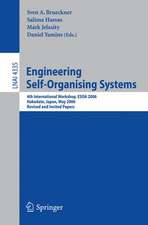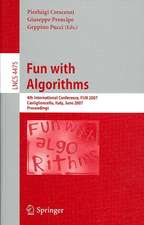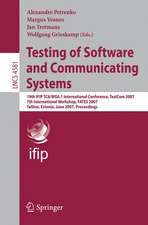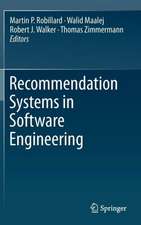Managing Requirements Knowledge
Editat de Walid Maalej, Anil Kumar Thurimellaen Limba Engleză Hardback – 13 iun 2013
This book discusses systematic means for managing requirements knowledge and its owners as valuable assets. It focuses on potentials and benefits of “lightweight,” modern knowledge technologies such as semantic Wikis, machine learning, and recommender systems applied to requirements engineering. The 17 chapters are authored by some of the most renowned researchers in the field, distilling the discussions held over the last five years at the MARK workshop series. They present novel ideas, emerging methodologies, frameworks, tools and key industrial experience in capturing, representing, sharing, and reusing knowledge in requirements engineering.
While the book primarily addresses researchers and graduate students, practitioners will also benefit from the reports and approaches presented in this comprehensive work.
| Toate formatele și edițiile | Preț | Express |
|---|---|---|
| Paperback (1) | 645.78 lei 6-8 săpt. | |
| Springer Berlin, Heidelberg – 8 iul 2015 | 645.78 lei 6-8 săpt. | |
| Hardback (1) | 655.85 lei 6-8 săpt. | |
| Springer Berlin, Heidelberg – 13 iun 2013 | 655.85 lei 6-8 săpt. |
Preț: 655.85 lei
Preț vechi: 819.82 lei
-20% Nou
Puncte Express: 984
Preț estimativ în valută:
125.49€ • 131.03$ • 103.86£
125.49€ • 131.03$ • 103.86£
Carte tipărită la comandă
Livrare economică 04-18 aprilie
Preluare comenzi: 021 569.72.76
Specificații
ISBN-13: 9783642344183
ISBN-10: 3642344186
Pagini: 360
Ilustrații: XV, 398 p.
Dimensiuni: 155 x 235 x 30 mm
Greutate: 0.7 kg
Ediția:2013
Editura: Springer Berlin, Heidelberg
Colecția Springer
Locul publicării:Berlin, Heidelberg, Germany
ISBN-10: 3642344186
Pagini: 360
Ilustrații: XV, 398 p.
Dimensiuni: 155 x 235 x 30 mm
Greutate: 0.7 kg
Ediția:2013
Editura: Springer Berlin, Heidelberg
Colecția Springer
Locul publicării:Berlin, Heidelberg, Germany
Public țintă
ResearchCuprins
An Introduction to Requirements Knowledge.- Unpacking Tacit Knowledge for Requirements Engineering.- Mining Requirements Knowledge from Operational Experience.- DUFICE: Guidelines for a Lightweight Management of Requirements Knowledge.- Constructing and Using Software Requirements Patterns.- Using Ontologies and Machine Learning for Hazard Identification and Safety Analysis.- Knowledge-Assisted Ontology-Based Requirements Evolution.- Reusing Requirements in Global Software Engineering.- Performative and Lexical Knowledge Sharing in Agile Requirements.- Using Web 2.0 for Stakeholder Analysis: StakeSource and its Application in Ten Industrial Projects.- Resolving Inconsistency and Incompleteness Issues in Software Requirements.- Automated Verification of Variability Model Using First Order Logic.- Model-based Requirements Engineering Framework for Systems Lifecycle Support.- An Overview of Recommender Systems in Requirements Engineering.- Experience based Requirements Engineering Tools.-The Eclipse Requirements Modeling Framework.- Managing Requirements Knowledge: Conclusion and Outlook.
Recenzii
“This book shows how the best practitioners canbecome even better. It assembles 15 valuable research papers, contributed by 51experts … presented at workshops between 2008 and 2013. … this assemblage andits contributing community are a valuable resource to those interested inadvancing the state of the art.” (Sushil Birla, Computing Reviews, October, 2015)
“This book delivers exciting insights into the benefits and use of knowledge technology for requirements engineering”. Barbara Paech, University of Heidelberg, Germany; Spokeswoman of the SIG “Software Engineering” in the German Computer Science Society (GI)
"Managing requirements knowledge lies at the heart of understanding stakeholder's needs and building software systems that address those needs. This book assembles key research contributions that will serve as an invaluable resource for researchers and enlightened practitioners in the area." Bashar Nuseibeh, The Open University, UK; Editor-in-Chief of IEEE Transactions on Software Engineering
“This book delivers exciting insights into the benefits and use of knowledge technology for requirements engineering”. Barbara Paech, University of Heidelberg, Germany; Spokeswoman of the SIG “Software Engineering” in the German Computer Science Society (GI)
"Managing requirements knowledge lies at the heart of understanding stakeholder's needs and building software systems that address those needs. This book assembles key research contributions that will serve as an invaluable resource for researchers and enlightened practitioners in the area." Bashar Nuseibeh, The Open University, UK; Editor-in-Chief of IEEE Transactions on Software Engineering
Notă biografică
Walid Maalej recently became a professor of informatics at the University of Hamburg. Prior to that, he had led a research group on context and human aspects in software engineering at the TU Munich, where he also received his Master and Doctorate degrees. For the Managing Requirements Knowledge book, Walid brings in a unique multidisciplinary and internationally renowned research profile covering the fields of Knowledge Management, Empirical Software Engineering, and Requirements Engineering.
Anil Kumar Thurimella is currently leading Requirements Engineering and Management for the BMW Programs at Harman Automotive Division in Munich. He is also an external Senior Researcher at the TU Munich, where he completed his Master’s degree and doctorate in Computer Science. For the Managing Requirements Knowledge book, Anil has contributed a unique blend of industrial and academic experience on Requirements Engineering.
Anil Kumar Thurimella is currently leading Requirements Engineering and Management for the BMW Programs at Harman Automotive Division in Munich. He is also an external Senior Researcher at the TU Munich, where he completed his Master’s degree and doctorate in Computer Science. For the Managing Requirements Knowledge book, Anil has contributed a unique blend of industrial and academic experience on Requirements Engineering.
Textul de pe ultima copertă
Requirements engineering is one of the most complex and at the same time most crucial aspects of software engineering. It typically involves different stakeholders with different backgrounds. Constant changes in both the problem and the solution domain make the work of the stakeholders extremely dynamic. New problems are discovered, additional information is needed, alternative solutions are proposed, several options are evaluated, and new hands-on experience is gained on a daily basis. The knowledge needed to define and implement requirements is immense, often interdisciplinary and constantly expanding. It typically includes engineering, management and collaboration information, as well as psychological aspects and best practices.
This book discusses systematic means for managing requirements knowledge and its owners as valuable assets. It focuses on potentials and benefits of “lightweight,” modern knowledge technologies such as semantic Wikis, machine learning, and recommender systems applied to requirements engineering. The 17 chapters are authored by some of the most renowned researchers in the field, distilling the discussions held over the last five years at the MARK workshop series. They present novel ideas, emerging methodologies, frameworks, tools and key industrial experience in capturing, representing, sharing, and reusing knowledge in requirements engineering.
While the book primarily addresses researchers and graduate students, practitioners will also benefit from the reports and approaches presented in this comprehensive work.
This book discusses systematic means for managing requirements knowledge and its owners as valuable assets. It focuses on potentials and benefits of “lightweight,” modern knowledge technologies such as semantic Wikis, machine learning, and recommender systems applied to requirements engineering. The 17 chapters are authored by some of the most renowned researchers in the field, distilling the discussions held over the last five years at the MARK workshop series. They present novel ideas, emerging methodologies, frameworks, tools and key industrial experience in capturing, representing, sharing, and reusing knowledge in requirements engineering.
While the book primarily addresses researchers and graduate students, practitioners will also benefit from the reports and approaches presented in this comprehensive work.
Caracteristici
Addresses crucial yet typically neglected issues in software projects Written by some of the most renowned researchers in the field with considerable experience Presents both novel theoretical approaches and practical experiences Includes supplementary material: sn.pub/extras
